Are you an agent trying to figure out how to get more seller leads? Well, you’re not alone. It’s one of the most common challenges that agents face, especially in competitive markets. Whether you’re just starting out or looking to grow your business, generating motivated seller leads is vital to the success of your growing business.
We’ll cover 13 proven strategies to generate real estate seller leads. Plus, we’ll introduce you to the tools that top-producing agents use to make it happen. You’ll walk away from this article with actionable tips and useful tools to help you build a strong, reliable pipeline of seller clients.
Why seller leads fuel your real estate business
Seller leads are the foundation to longevity in the real estate industry. My grandpa always said, “Buyers are your money now, but sellers are your future money.” Let’s unpack that statement.
When you work with sellers, you’re able to create opportunities to generate more leads than you would with just one buyer client. Why is that? As a seller’s agent, you’re the face of the listing. Potential buyers see your name and contact information on each advertisement – from the sign in the front yard to all digital marketing. If an interested buyer doesn’t have representation, they will likely reach out to you to see the home. The best part? If they don’t buy your listing, they may use you to purchase another home if you play your cards right.
While buyer leads are invaluable, they often are not as committed and could just be exploring their options. Until you actually sell them a home, they’re less likely to bring in future business for you. Focusing on seller leads fuels long-term growth – and keeps your pipeline full.
1. Tap into your sphere of influence
Your sphere of influence is the easiest and fastest way to secure any type of lead – especially seller leads. List out every friend, family member, neighbor and other local business providers and make sure they are added to your database. The odds are that they will know of someone who is looking to sell their home, even if they’re just curious about selling. Don’t be shy – they won’t bite!
Send a quick check-in email or text with a simple message: “Hey! I hope you’re doing well. Do you know anyone who’s planning on selling their home in the next six months? I’d love to help.” This approach works well because people want to help people they know and trust.
Tool to try: Top Producer
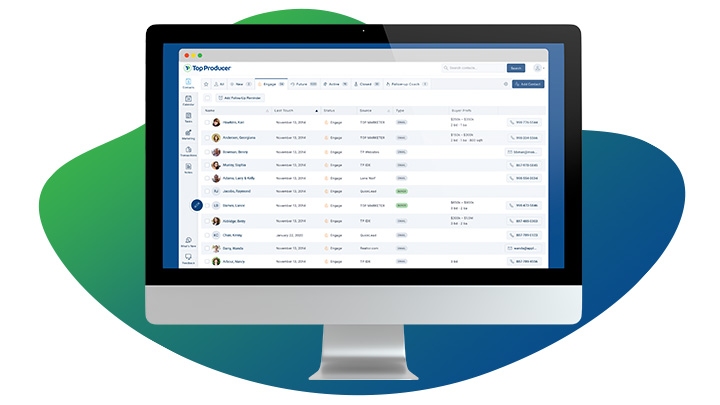
Top Producer is a CRM designed just for agents and includes all the bells and whistles. This CRM makes it easy to organize your contacts, set reminders for follow-ups and keep track of important details. It features automated drip campaigns that can be personalized, helping you nurture your sphere and stay top-of-mind with your sphere and any potential seller leads.
2. Leverage your social media platforms
Social media is one of the most effective ways to generate seller leads. According to the National Association of Realtors (NAR), social media is about twice as powerful as MLS for generating seller real estate leads. Popular platforms like Facebook, Instagram, TikTok and LinkedIn allow you to showcase your expertise by sharing market insights and building relationships with potential clients. These platforms also allow your personality to shine through, so potential clients can feel like they know who you are.
The key to success on social media is consistency. Make sure the content you post is helpful – like sharing success stories or providing market updates. Keep the content light, fun and focused on the demographic you’re trying to target.
Tool to try: Coffee and Contracts

Coffee and Contracts is our go-to for creating consistent and attractive marketing content that can be used across platforms, including Instagram (posts, reels, stories), Facebook and even LinkedIn. Their ready-made social media templates are designed specifically for real estate agents. It helps you stay consistent, create engaging posts and market yourself without spending hours brainstorming what to say next. The consistency that Coffee and Contracts bring makes it easy to build a cohesive brand image.
3. Implement paid online advertising
Whether you create your own content or use ready-made marketing, agents should consider running paid ads through targeted marketing on platforms like Facebook or Instagram. Paid online advertising is a smart way to grow your audience while reaching homeowners who may be thinking about selling their home – especially if you’re having a hard time reaching them organically. These paid real estate ads can help you reach leads in specific neighborhoods, demographics and similar interests while keeping you top of mind in their feed.
Tool to try: Meta Ads

Meta Ads Manager helps you create targeted ad campaigns to reach potential sellers. It allows you to track your ad performance and refine your messaging to get better results. It’s a go-to for real estate agents looking to grow their reach and generate more seller leads.
4. Join a referral network
With so many seller leads out there, it’s a wonder how agents can keep up with all of them. And in some circumstances, they can’t or a client is outside their jurisdiction, so they want to pass them on to an agent who can help. That’s where joining a referral network will benefit you, other agents and seller clients. Referral networks connect sellers and buyers with highly qualified agents to assist them through the real estate process. By finding and joining a referral network, you’ll be opening your business up to leads who are ready to buy and sell now.
Tool to try: Sold.com

Sign up for FREE to join Sold.com’s referral network. You’ll complete their informational sign-up form to create a profile and sign their referral agreement. This will outline the terms of your referral relationship and allow you to start receiving leads. You’ll only pay once you close a deal from a Sold.com referral client. As you continue to close deals with Sold.com leads, you’ll receive more leads to continue building your pipeline.
5. Supercharge your CRM
While searching for new seller leads is a lucrative way to find clients, diving into your existing leads and contacts is an untapped opportunity. Even if you have just 100 contacts, if you have 5% that are looking to sell, that’s five new listings! That means it’s time to jump into your CRM and optimize your contacts so you know who might be ready to sell. If you’re going to do it manually, here are some things you can do:
- Remove duplicate contacts
- Input all information you can for each contact (contact information, property addresses, length of time at current address, property price, social media handles, etc.)
- Review previous communication with contacts to see who could be a hot lead
- Segment your audience by interest (buyers, sellers, renters, etc.)
Tool to try: Fello
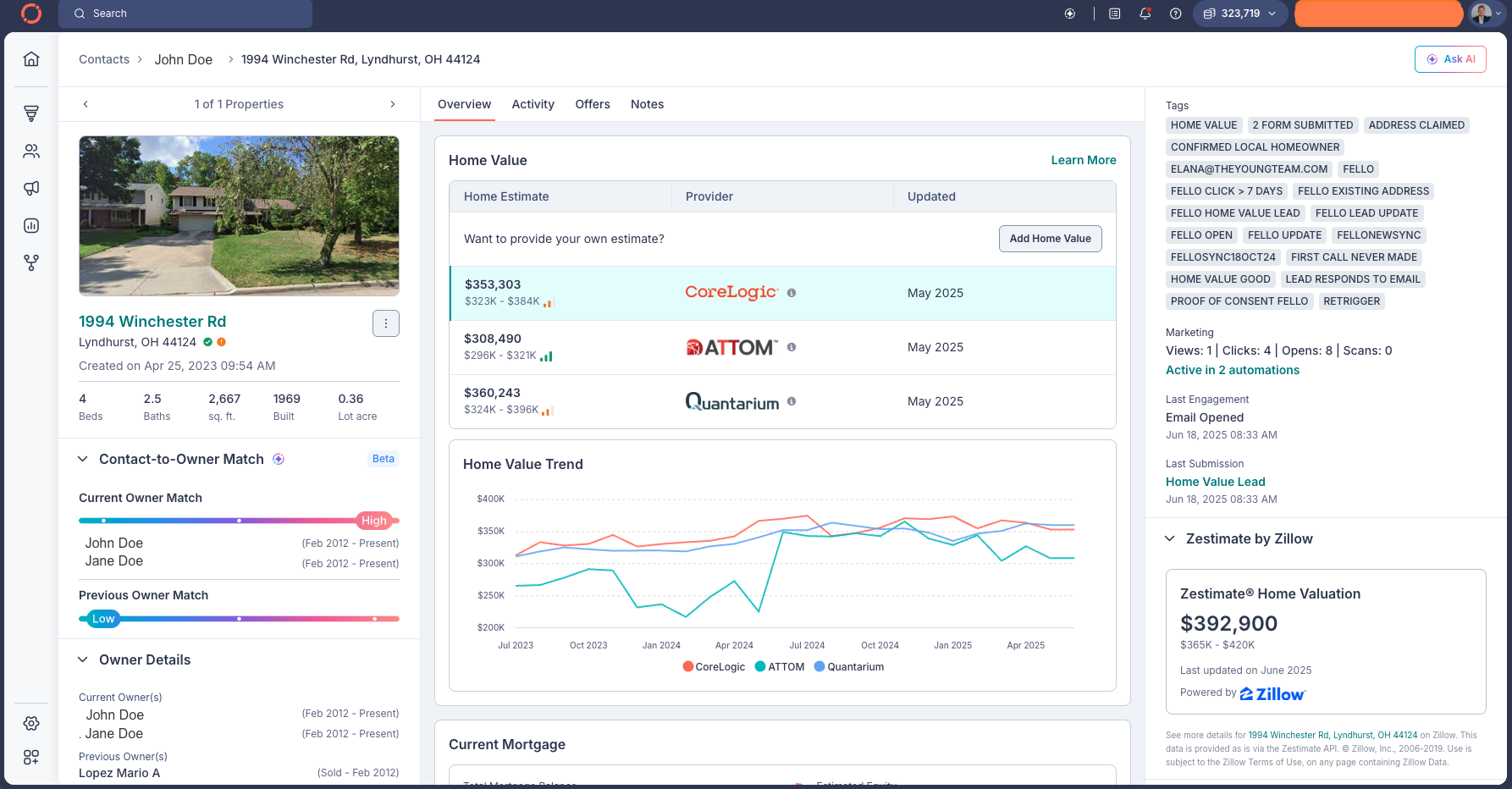
It may be free, but manually going through your CRM will take a lot of time and effort. If you want an easier way to supercharge your CRM, check out Fello. Its AI-driven technology optimizes your contact list to autopopulate behavioral and property data to determine who is most likely to sell. Then, Fello will use lead scoring on all contacts in your database so you know who to prioritize. Simply connect Fello to your current CRM and get to work!
6. Launch targeted marketing campaigns
Marketing campaigns are another great way to nurture your seller leads over time. There are several options to try to reach your target audience including newsletters, postcards and/or email campaigns. Each interaction should include something of value that the seller actually uses to make a selling decision. Just sold and listed postcards provide a sneak peek into homes for sale in their area while newsletters can provide valuable housekeeping tips or market insights.
The marketing campaign with the best return on investment is an email marketing campaign. Many CRMs have automated marketing features included, making them easy to use and allowing you to access every contact and lead at once. The goal is to build trust with value and repetition. People may not be ready to sell today, but when they are you’ll be the name they remember when the time comes.
Tool to try: Zurple
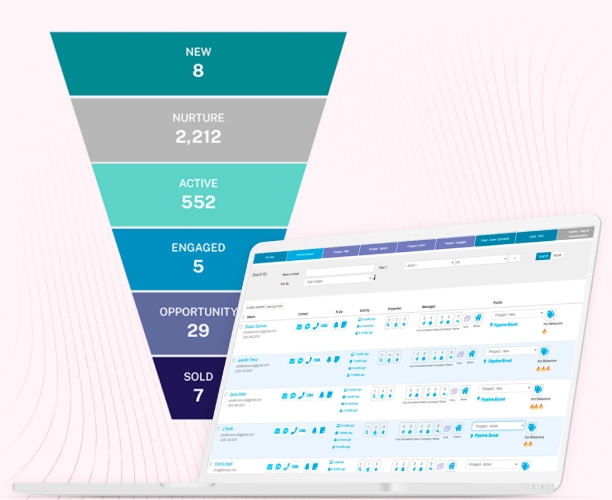
Zurple’s Client Generation Platform is an all-in-one system designed to automate real estate lead generation with intelligent and personalized communication. It helps you stay connected with your leads through targeted campaigns that bring your voice into the marketing. The automated follow-up feels authentic, not robotic – allowing you to keep your pipeline full without spending hours on manual follow-up.
7. Optimize your website and landing pages for lead capture
Let’s face it – it’s the 21st century. If you’re a real estate agent without a web presence, you may have a hard time gaining traction among the competition. According to the NAR, 64% of broker/broker associates and 73% of sales agents have a website. If you want a shot at generating seller leads online, you’re going to need one as well.
The key is to drive sellers to your website by creating custom landing pages that offer something of value – like a free home valuation. These pages can be linked to your marketing content and set up to capture leads automatically or by having them fill out a form. Be sure your website has a call-to-action that clearly states who you are, how to contact you, the services you provide, and why you’re the go-to expert they should choose to list their home.
Tool to try: Real Geeks
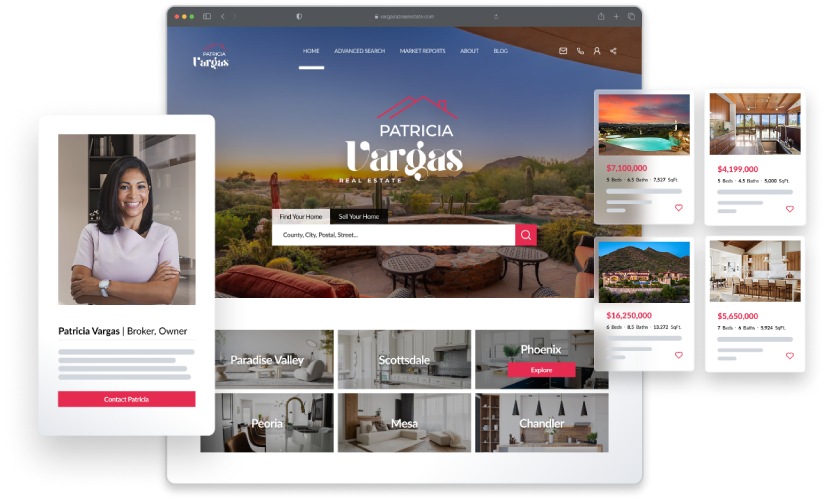
Real Geeks offers customizable real estate websites and landing pages that are designed to capture seller leads with every click. They feature built-in lead forms, home valuation tools and integration with top CRMs. If you don’t already have a CRM, Real Geeks has you covered by offering websites that have a CRM built right in. At every turn, they help agents convert website visitors into listing opportunities.
8. Target expired listings and FSBOs
Remember, earlier I mentioned that social media is twice as effective as using the MLS to generate seller real estate leads? If you were thinking, “How does the MLS help me generate seller leads?” Here’s your answer: You can utilize the MLS to find expired listings and turn them into motivated seller leads. They’re already more likely to list their home because they already did at one time, but didn’t get the result that they wanted. This is your time to shine and swoop in with the latest market updates and your own personal touch.
When you reach out to an expired listing, it’s important to focus not only on what went wrong the first time but, more importantly, how you’ll do things differently this time. Offer them a free in-person home valuation where you provide them with an updated comparative market analysis (CMA) and a fresh marketing strategy. With a little persistence, you can bring that expired listing to life.
Tool to try: REDX
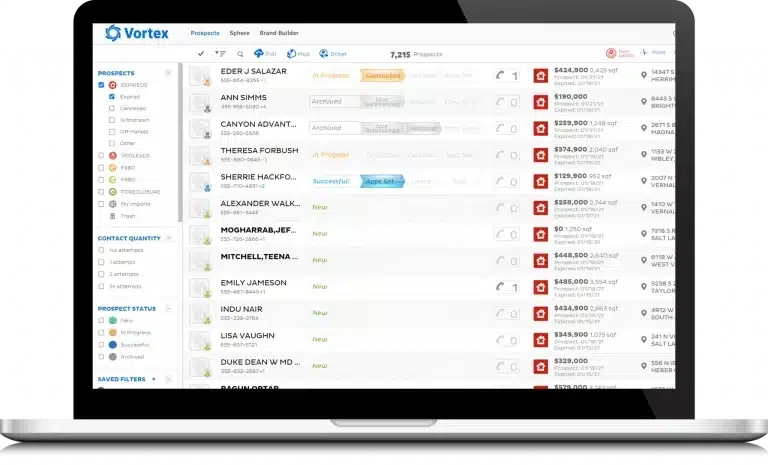
The MLS can only take you so far in converting expired listings. You won’t find seller contact information in the MLS, so you’ll either need to get creative or get REDX. They provide a list of expired listings that are sent directly to you each day. The listings include verified contact information that has been run through the do-not-call registry (DNC), keeping you compliant with state and federal laws. REDX even connects to most CRMs, so you can continue to manage all of your leads in the same place.
9. Host virtual networking events
We may be well past the COVID era, but virtual events are here to stay. Consider hosting a virtual networking event, like a virtual open house or a free home valuation workshop. I know what you’re thinking: “How is a virtual open house going to attract seller leads?” There’s nothing like a nosy neighbor to bring you your next closing. Neighbors love to take a look at the inside and see what your listing has that their home doesn’t – and vice versa. It’s a great time to have a conversation about what their house may be worth and introduce yourself as the community expert.
Virtual networking events can open the door to new relationships, referrals and potential seller clients. It’s also a great way to stay top-of-mind with your sphere and demonstrate your commitment to supporting the community.
Tool to try: Zoom
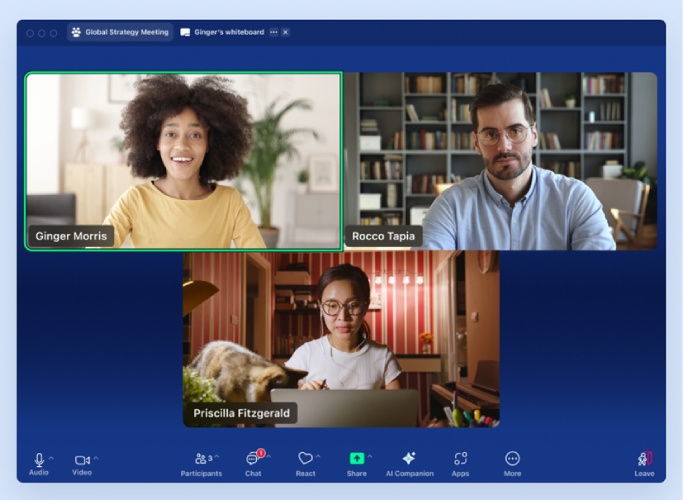
In order to host virtual events, you’ll need a platform to connect with more than one person at a time – enter Zoom. Its versatile platform is easy to use with safety controls that allow you to decide who can join your event, when they can speak and the ability to control the overall flow of the event. It’s one of the most reliable ways to host a webinar or virtual event, whether you’re meeting with one person or hundreds.
10. Engage in community events
Getting involved in community events is a powerful way to build your local reputation and connect with homeowners who may be thinking about selling. Whether you’re sponsoring a charity run, hosting a booth at a neighborhood festival or organizing a park cleanup, your visibility makes you the agent who truly cares about the community – and that can turn into seller leads over time. Community involvement also gives you a chance to meet homeowners face-to-face while having meaningful conversations without any pressure to close a sale.
The challenge is that you are only one person and can only attend so many local events. This is where technology will help you connect with the community to find seller leads. As an agent, participating in any type of online community enhances your reputation and also places you top of mind when homeowners consider selling. Through community engagement, you will gain a deeper understanding of the local real estate market and the concerns of potential sellers, which is invaluable for tailoring your services and marketing strategies.
Tool to try: Parkbench
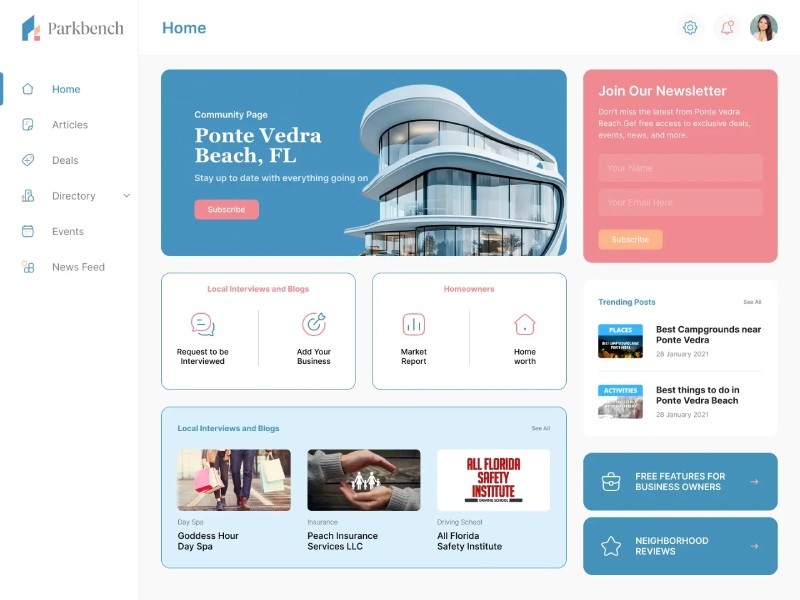
In a play on words of an old marketing tactic, Parkbench brings you to the local community without slapping your face and business name on a literal park bench. This genius company has created a network of hyper-local neighborhood websites. Each customized website is sponsored by just one real estate professional, so if you’re community-minded and want to engage with residents and neighbors, Parkbench might be right for you. The ultimate goal is to get business, but ideally, each Parkbench agent also genuinely cares about their community and enjoys sharing resources, answering questions and being helpful.
11. Collaborate with local businesses
Another way of generating real estate seller leads within the community is to partner with local businesses to co-sponsor events. Partner with moving companies, landscapers, home stagers, contractors and even local restaurant owners. Anyone in the community who works with homeowners can refer business to you, and in return, you can promote their services to your network.
This strategy has been tried and tested for generations, helping you expand your reach and create a trusted network for everyone. Homeowners want an agent with strong local ties and collaborating with other trusted businesses shows that you’re plugged into the community.
Tool to try: Google Business Profile
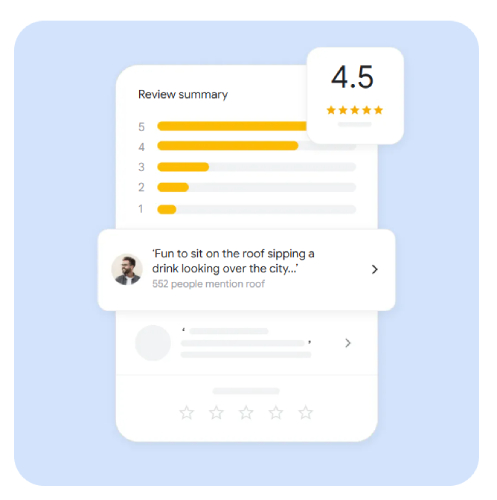
A Google Business profile is what helps you get discovered by potential clients and connect with local businesses. You need to register your business with Google – don’t worry, it’s free! Once your business is verified, be sure to keep your profile updated with your service information, reviews and photos. This will increase your visibility in local searches, which will open the door to partnerships with other professionals in your area. It’s also a great way to show the public how involved you are in the community, which will reinforce your credibility with potential clients.
12. Start using AI predictive analytics tools
Artificial intelligence (AI) is transforming the way real estate agents generate seller leads. By analyzing hundreds of data points—like market trends, historical sales data, consumer behavior, credit card debt and more—AI tools can predict which homeowners are most likely to list their properties in the near future.
These insights allow agents to focus their marketing efforts (and budget!) on homeowners who are statistically more likely to sell, helping you work smarter, not harder. Let’s face it, lead generation can get expensive. If there’s a way to get more bang for your buck, AI predictive analytics is a powerful tool to have in your arsenal.
Tool to try: Smartzip
Smartzip uses predictive analytics to identify people who are likely going to sell within the next six to 12 months. It provides you with targeted lead lists, automated marketing tools and lead insights that help you focus on homeowners who are most ready to sell. Smartzip uses AI to take the guesswork out of prospecting – saving you time and increasing your chances of converting your leads into listings.
13. Offer free resources and guides
No matter what marketing medium you use, consider offering free homeowner resources to help you capture seller leads. Create customized home selling guides, market reports, homebuyer checklists and customized CMAs to help you engage with potential sellers. These resource guides should answer frequently asked homeowner questions, like what their home is worth or how they can prepare their home for sale.
The objective in offering these free resources is to position yourself as the local expert while also showing you’re willing to share valuable insights without the pressure of signing a contract. Your website is a great place to offer free downloads to help you grow your database with motivated seller leads.
Tool to try: Canva

Canva makes it easy to create professional-looking guides, checklists and market reports that look polished and on-brand. With ready-made templates and simple drag-and-drop tools, you can design resources that homeowners actually want to download—without needing a graphic design background.
Real estate seller leads: FAQs
Where do most real estate agents get their leads?
There is not one right or wrong answer to this question. Real estate agents get their leads from many different sources – personal referrals, their sphere of influence, open houses, social media, paid ads, paid leads and the list goes on and on. No matter how they get their leads, most agents find it helpful to have a CRM to input their lead’s contact details in and keep track of where each one is in the buying or selling process.
The best way to get leads for one agent may not be the best way for another agent. The right mix of lead sources will look different for everyone, but the key is to make sure you don’t rely too heavily on one lead source and diversify your approach to getting leads.
Is it worth paying for real estate leads?
Sometimes, it just depends on who you are and how you operate your business. Paying for leads can be worth it if you’re willing to put in the time and effort to actually convert them. You’ll also need a good lead follow-up system in order to nurture the leads and stay consistent with your communication.
Newer agents may find paid leads helpful to build their pipeline, but may find it hard to afford it. There are some pay at closing lead platforms that may be a bit more pricey, but offer the flexibility of paying at closing instead of out of pocket. If you choose to purchase leads, don’t stop your organic reach. The goal is to build a pipeline of steady business so you don’t need to continue paying for leads for very long.
How do you get seller leads in real estate?
You’ll need to position yourself as the expert who helps homeowners navigate the selling process. You want to start by farming leads organically like using your sphere of influence or marketing on social media. Be sure you’re prepared to answer questions about market conditions and have resources for homeowners ready to share.
Also, you’ll need to ensure you have the right tools and systems in place to find and manage any leads that come your way. At the end of the day, it’s about building relationships and offering value before you ask for the listing.
The full picture: Real estate seller leads
Finding seller leads can feel like you’re chasing down a moving target, but it doesn’t have to. You will consistently generate high-quality seller leads by tapping into your sphere, leveraging the latest technology and hosting events within your community.
Try to remember that it’s not just about getting seller leads, it’s about building relationships and showing homeowners that you really do know what you’re talking about – and that they can rely on you to get their home sold. Start putting these tips and tools to work for you today, and watch your seller real estate lead pipeline grow.









